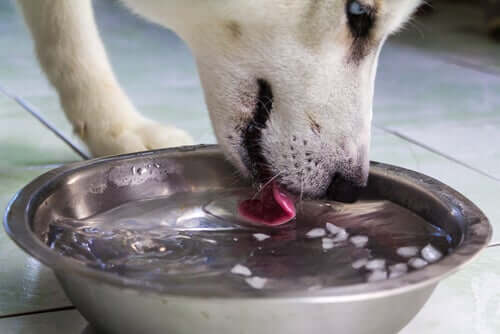Why Dogs Get Dry Noses


Written and verified by biochemistry Luz Eduviges Thomas-Romero
Most dog owners worry when their dog has a dry nose. When they see it, they wonder if it means there’s something wrong with their health. However, there are many reasons why dogs get dry noses, not just because they’re sick.
Knowing what’s normal and what’s not is important for monitoring a dog’s health. This applies to all parts of the body, not just the nose. We’ll discuss some of the reasons why dogs get dry noses below.
1. The first cause: dehydration
Some dogs don’t drink enough water during the day. Dogs can easily become dehydrated. A cracked, dry nose can be the first sign of dehydration. However, this is usually accompanied by dry skin.
Make sure your dog always has a clean water supply available. Remember that dehydration involves other organs of your pet, such as the kidneys.

2. Dry nose in sleeping dogs
One of the reasons why a dog’s nose is wet is because they’re usually licking it constantly. Of course, when a dog sleeps, they stop licking their nose.
When a dog wakes up, it’s normal for their nose to be dry, but it will soon become wet again as the day goes by.
Despite what you might think, when a dog has a dry nose, it doesn’t mean there’s something wrong with their health.
3. A seasonal problem
During cold seasons, dogs love to sleep near heating. The warm air offers comfort and warmth. Unfortunately, if they get too close, they’ll end up with a cracked, dry nose.
Fortunately, once the dog moves away from the heater, their nose will go back to its usual wet state. Applying a little pet lubricant can help speed the process along.

4. Why dogs get dry noses: allergies
Sometimes, a dog will have a dry nose because of allergic reactions. When this happens, the best thing you can do to avoid a dry nose is to get rid of what causes the allergy. If this doesn’t help, you can visit the vet who will administer allergy medicine.
A common cause of dry nose from allergies is sensitivity to plastics. If your dog’s food or water bowls are plastic, consider changing them. Two good options for replacing plastic are ceramic or stainless steel. Keep them clean and sterile all the time. Also remove other plastic items from the dog’s environment, including toys.
Why is my dog’s nose dry and very hot?
A dog owner usually worries when they notice that their pet’s nose is unusually dry. Are they sick? What does it mean when a dog’s nose isn’t cold and wet? Don’t be afraid. According to various studies, there’s no direct correlation between the moisture in a dog’s nose and their health status.
You shouldn’t assume your dog is ill if they have a dry nose. Sometimes a completely healthy dog’s nose changes between cold and wet and warm and dry. These changes can be seen throughout the day.

When a dog has a dry nose that’s also unusually warm, it shouldn’t be a cause for concern if the dog is active and happy. If your dog has a dry nose and is also lethargic or inactive, it may indicate fever. Remember, there are some skin diseases and immune problems that can be spotted through several symptoms in the nose.
When you examine a dog’s nose to assess their health, check if they have a runny nose, because this is a determining factor. It’s okay if their nose produces clear, viscous mucus, even if it’s a little dry or hot. However, if the nasal discharge is black, yellow, green, or viscous, you should consult your vet.
Most dog owners worry when their dog has a dry nose. When they see it, they wonder if it means there’s something wrong with their health. However, there are many reasons why dogs get dry noses, not just because they’re sick.
Knowing what’s normal and what’s not is important for monitoring a dog’s health. This applies to all parts of the body, not just the nose. We’ll discuss some of the reasons why dogs get dry noses below.
1. The first cause: dehydration
Some dogs don’t drink enough water during the day. Dogs can easily become dehydrated. A cracked, dry nose can be the first sign of dehydration. However, this is usually accompanied by dry skin.
Make sure your dog always has a clean water supply available. Remember that dehydration involves other organs of your pet, such as the kidneys.

2. Dry nose in sleeping dogs
One of the reasons why a dog’s nose is wet is because they’re usually licking it constantly. Of course, when a dog sleeps, they stop licking their nose.
When a dog wakes up, it’s normal for their nose to be dry, but it will soon become wet again as the day goes by.
Despite what you might think, when a dog has a dry nose, it doesn’t mean there’s something wrong with their health.
3. A seasonal problem
During cold seasons, dogs love to sleep near heating. The warm air offers comfort and warmth. Unfortunately, if they get too close, they’ll end up with a cracked, dry nose.
Fortunately, once the dog moves away from the heater, their nose will go back to its usual wet state. Applying a little pet lubricant can help speed the process along.

4. Why dogs get dry noses: allergies
Sometimes, a dog will have a dry nose because of allergic reactions. When this happens, the best thing you can do to avoid a dry nose is to get rid of what causes the allergy. If this doesn’t help, you can visit the vet who will administer allergy medicine.
A common cause of dry nose from allergies is sensitivity to plastics. If your dog’s food or water bowls are plastic, consider changing them. Two good options for replacing plastic are ceramic or stainless steel. Keep them clean and sterile all the time. Also remove other plastic items from the dog’s environment, including toys.
Why is my dog’s nose dry and very hot?
A dog owner usually worries when they notice that their pet’s nose is unusually dry. Are they sick? What does it mean when a dog’s nose isn’t cold and wet? Don’t be afraid. According to various studies, there’s no direct correlation between the moisture in a dog’s nose and their health status.
You shouldn’t assume your dog is ill if they have a dry nose. Sometimes a completely healthy dog’s nose changes between cold and wet and warm and dry. These changes can be seen throughout the day.

When a dog has a dry nose that’s also unusually warm, it shouldn’t be a cause for concern if the dog is active and happy. If your dog has a dry nose and is also lethargic or inactive, it may indicate fever. Remember, there are some skin diseases and immune problems that can be spotted through several symptoms in the nose.
When you examine a dog’s nose to assess their health, check if they have a runny nose, because this is a determining factor. It’s okay if their nose produces clear, viscous mucus, even if it’s a little dry or hot. However, if the nasal discharge is black, yellow, green, or viscous, you should consult your vet.
All cited sources were thoroughly reviewed by our team to ensure their quality, reliability, currency, and validity. The bibliography of this article was considered reliable and of academic or scientific accuracy.
- Tress, B., Dorn, E. S., Suchodolski, J. S., Nisar, T., Ravindran, P., Weber, K., … Schulz, B. S. (2017). Bacterial microbiome of the nose of healthy dogs and dogs with nasal disease. PLOS ONE, 12(5).
- Hoffmann, A. R., Patterson, A. P., Diesel, A., Lawhon, S. D., Ly, H. J., Stephenson, C. E., … Olivry, T. (2014). The Skin Microbiome in Healthy and Allergic Dogs. PLOS ONE, 9(1).
- Hensel, P., Santoro, D., Favrot, C., Hill, P., & Griffin, C. E. (2015). Canine atopic dermatitis: detailed guidelines for diagnosis and allergen identification. BMC Veterinary Research, 11(1), 196–196.
- Js, W. (1980). Toxic myopathy in a dog associated with the presence of monensin in dry food. Canadian Veterinary Journal-Revue Veterinaire Canadienne, 21(1), 30–31.
This text is provided for informational purposes only and does not replace consultation with a professional. If in doubt, consult your specialist.








